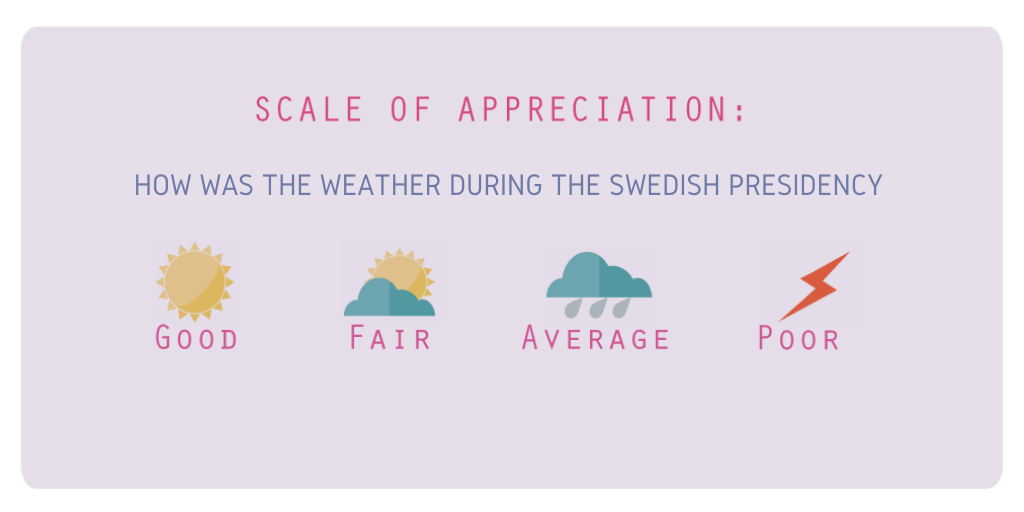MHE Publishes Swedish EU Presidency Scorecard (January-June 2023)

Mental Health & Human Rights
In order to engage with and analyse the performance of the rotating Presidency of the Council of the European Union (EU), Mental Health Europe has devised a scorecard system through which we evaluate each Presidency’s commitment to and promotion of mental health. The performance of each Presidency is rated based on the following criteria:
- Promotion of mental health and well-being;
- Commitment to the rights of persons with psychosocial disabilities;
- The involvement and empowerment of users of mental health services.
Looking back –Expectations and Outcomes
Sweden assumed the Presidency of the Council of the EU in the first half of 2023, setting the following priorities for its mandate: security, competitiveness, green and energy transitions, democratic values and the rule of law. The Swedish Presidency pledged to use the EU Strategy for the Rights of Persons with Disabilities as a springboard for highlighting disability policy issues to promote, protect and ensure the full and equal enjoyment of human rights for people with disabilities. The public health policy risks relating to increased loneliness was also a focus of the programme. Interestingly, the Swedish Presidency set out to highlight the social dimension of sustainable development, stressing that young people’s participation in political decision-making enables better, more sustainable decisions.
Promotion of mental health and well-being – Good
In the Conclusions on the social dimension of a sustainable Europe for youth 2023, the Council invited Members States to prioritise mental health and well-being among young people, by recognising mental health problems as one of the most significant health concerns for young people, by strengthening knowledge-based mental health promotion, mental health literacy and prevention efforts in different settings, through cross-sectoral approaches. The Council also invited the Member States and the European Commission to collect disaggregated data in view of the potential need for indicators and monitoring mechanisms on how social exclusion and climate change relate to young people’s mental health.
With the ambition to establish synergies with the European Commission’s new initiative for mental health, the Swedish Presidency highlighted the issue of loneliness and its connection to mental health. On 20 and 21 April, a High level meeting on loneliness was held. The meeting was an opportunity to increase the political visibility of social relations and speed up the implementation of evidence-based solutions to decrease social isolation and loneliness.
On 15 and 16 May, the Swedish Presidency organised a high-level Occupational Safety and Health (OSH) Summit, putting the spotlight on the implementation of the Strategic Framework on Health and Safety at Work 2021-2027. The Summit identified ongoing growing OSH issues that need intensified further consideration, including psychosocial risks and mental health at work.
Under the Swedish Presidency, the Council reached an agreement on the proposed Directive on improving working conditions in platform work. Its position gives indications to digital labour platforms on how to mitigate mental health risks for platform workers related to automated monitoring or decision-making systems.
In the Council conclusions on EU priorities in UN human rights fora 2023, it is affirmed that the EU will promote a human rights-based approach to new digital technologies. It is also stated the need to effectively address violence against children online, all forms of exploitation and abuse, cyberbullying, and exposure to harmful content. Even though mental health is not explicitly mentioned, the human rights-based approach is in line with MHE vision on digitalisation and mental health.
Commitment to the rights of persons with psychosocial disabilities – Good
In the Council conclusions on EU priorities in UN human rights fora 2023, it is stated that the EU will continue to strongly oppose and step up action to combat all forms of discrimination, with a specific attention to multiple and intersecting forms of discrimination, including on grounds of disability.
On 4 April, the Swedish Presidency held an event on renewing priorities for social inclusion and access to adequate housing. MHE was invited as a speaker to share knowledge and experiences on community-based living and person-centred services to prevent homelessness among people with psychosocial disabilities.
In order to highlight and raise awareness of disability strategies across the EU, the Swedish government and the European Commission co-organised the seminar Union of Equality – Disability Rights and Strategies on 27 June. During the event, examples of policy frameworks as well as practical solutions on how to improve equality were presented and discussed.
The involvement and empowerment of users of mental health services – Fair
The Swedish Presidency was a strong advocate of youth participation in decision-making, including unrepresented and under-represented groups of young people, as expressed by the Council Conclusions on the social dimension of a sustainable Europe for youth 2023. Young advocates were invited to speak on children’s participation in policy processes at relevant events held by the Swedish Presidency.
In relation to people with disabilities, the Swedish Presidency showed a clear commitment to learn from experts by experience and to exchange on methods for including persons with disability in the development processes of all matters that concern them. Persons with lived experience of psychosocial disabilities were present at the event on Renewing priorities for social inclusion and access to adequate housing and could share their expertise on the topic. However, psychosocial disabilities was unfortunately an overlooked topic at the seminar Union of Equality – Disability Rights and Strategies and people with lived experience of mental health were absent from the programme.
Conclusions
The Swedish Presidency performed very well in relation to promotion of mental health across Europe, by stressing the links between socio-economic and environmental factors and mental health, and by highlighting the need to act at early stages of life. Mental Health Europe commends the attention dedicated by the Swedish Presidency to prevention and the call for cross sectoral actions, as these are key elements of a Mental Health in all policies approach. Similarly, the emphasis on human rights, equal treatment and meaningful engagement of people with disabilities deserves praise. We would have welcomed a more specific focus on people with psychosocial disabilities, notably by ensuring their active participation at key events organised under the Swedish Presidency.
Stay connected
Get our latest news, personal stories, research articles, and job opportunities.

